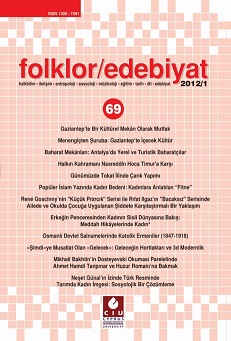Mİkhail Bakhtin’in Dostoyevski Okuması Paralelinde Ahmet Hamdi Tanpınar ve Huzur Romanı’na Bakmak
The view of Ahmed Hamdi Tanpınar and His Novel named as “Huzur” in the Parellel of Reading Dosteyevsky of Mikail Bakhtin
Author(s): İlkay DemirkürekSubject(s): Novel, Comparative Study of Literature, Russian Literature, Turkish Literature
Published by: Uluslararası Kıbrıs Üniversitesi
Keywords: Bakhtin; Dostoyevsky; Tanpınar; dialogical; Novel; Huzur;
Summary/Abstract: Dialogue, polyphony, miscegenation as well as characteristics held by the facts inevitably are moral and social values that required to be gone after and to be made an endeavor in order to achieve them. This study which includes reading of Ahmet Hamdi Tanpınar in line with reading of Dostoyevsky by Bakhtin who stated that the novel is dialogic pursuant to its design, centralizes the novel Huzur. Bakhtin states that Dostoyevsky’s novels are dialogic and works of authors such as Tolstoy, Turgenev are even less novel – like and more monologic compared with works of Dostoyevsky. Finding fundamental parallelism between works of Dostoyevsky and “carnival” and “Socratic dialogue” Bakhtin argues that works of Dostoyevsky also have a close relationship with adventure novels. If trace of the dialogic being mentioned above is sought in Huzur, a novel by Ahmet Hamdi Tanpınar, it is seen that dialogic being exposes occasionally and at some points. However, it should be noted that there closing of classical novel occurs occasionally. Tanpınar establishes the dialogic being over a single protagonist. Suad is alike with Dostoyevsky’s protagonists. She is a curious, sometimes foolish, seeking for the reality, making scandal speeches, absurd and unfitting person. It is possible to see main components of a dialogic novel – unexpected changes, passion close to the boundaries of madness and persons on the border of craziness and suicide, inconstant characters. Protagonists exhibits contradictory ideas within the novel but it does not lead a judgment. Changing, transforming the protagonists who have these ideas, at the end of novel he impedes certain denotation stability. Leaving the end of novel uncertain, Tanpınar enables the audience to fill the gaps.
Journal: Folklor/Edebiyat
- Issue Year: 18/2012
- Issue No: 69
- Page Range: 195-206
- Page Count: 12
- Language: Turkish

